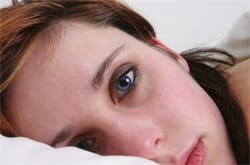What is bipolar insomnia? How are bipolar disorder and insomnia connected?
Sleep disturbance is a significant feature of bipolar disorder, and is one of several criteria used for diagnosis, as it is a frequent symptom of both mania and depression.
During manic episodes it’s common to feel a decreased need for sleep, or suffer from insomnia; however, these are distinct entities.
3
But insomnia, and the associated sleep loss inherent to bipolar disorder aren’t just symptoms of mania; reduced sleep can also trigger manic episodes and is a good predictor of the onset of mania.
The depressed phase of bipolar is characterized by hypersomnia, where a person sleeps for extended periods or naps frequently throughout the day. This irregularity in sleeping patterns then tends to increase the risk of new episodes of mania or depression.

Interestingly, research has found that disrupted sleep patterns are common in people with bipolar disorder even between bipolar episodes.
For reasons not yet understood, people with bipolar disorder have more delicate body clocks. 4 (bipolar disorder with mixed features showed a greater severity of insomnia and chronobiological rhythm de-synchronization)
The treatment of sleep disturbances and maintaining a regular sleep/wake cycle are important components in the prevention of mood episodes in bipolar disorder.
Circadian rhythms, bipolar and sleep
A circadian rhythm is approximately a 24-hour cycle in our biochemical, physiological and behavioral processes.
Reminder
Not sleeping but still feel energized? This is a classic sign of bipolar mania.
Our circadian rhythms govern sleep, hormonal function, appetite, and body temperature.
Scientific research suggests that the Clock gene, which regulates the body’s circadian rhythms, may be involved in the development of bipolar disorder.
5 (CLOCK genotype associated with worse insomnia)
People with bipolar disorder generally have irregularities in their circadian functions, including the body clock and its sleep/wake cycle.
Exhaustion, sleeplessness and disruptions to sleep patterns can trigger a bipolar episode.
6 (strategies for sleep to avoid mood disruption)
Establishing and maintaining a regular sleep/wake schedule, as well as stabilizing the circadian rhythm, are the primary elements of a relatively new treatment for bipolar disorder.
Some scientists believe that the increase of bipolar disorder in modern times is caused by the widespread use of artificial light. Before artificial light people’s sleep/wake cycles were regulated by the sun; it is possible that people who are genetically predisposed to bipolar disorder may develop the condition without the overall patterns of dark and light changing slowly and naturally.
Regular sleep helps bipolar
Sleep is an essential part of good health in all people and is vital to our well-being. Insufficient sleep causes significant health problems such as increased stress on the immune system, anxiety, depression, and increased risk for gastrointestinal and cardiovascular disease.
Deep restful sleep is of particular importance to manic depressives, as bipolar disorder can impair judgment and lack of sleep can exacerbate this.
1
Daytime mood regulation and night-time sleep form a two-way relationship; once rhythms are disturbed such as with bipolar insomnia, a self-perpetuating cycle can begin where moods interfere with sleep and then disrupted sleep affects mood regulation the following day.
It is recommended that people suffering from bipolar insomnia and hypersomnia sleep between 7-9 hours a night, go to bed at the same time each night, and get up at the same time each morning.
Regular schedules and sleep patterns have a positive affect on bipolar treatment and it is advised that activities that disturb normal routines be avoided. Re-establishing and maintaining a regular sleep, meal and activity schedule is one of the reasons why a stay in a bipolar treatment center can be so helpful.
Bipolar sleep tips
Some tips for establishing healthy sleep patterns to combat bipolar insomnia are:
2,6
1. Determine your need for sleep and meet it nightly.
2. Go to bed at the same time and get up at the same time.

3. Create a bed-time routine.
4. Limit napping to one short, early afternoon nap.
5. Use sleep as an aid to deal with oncoming mood episodes that are foreshadowed by prodromal signs.
6. Use a journal to record any thoughts that might be keeping you awake.
7. Try relaxation tapes and techniques.
8. Exercise regularly.
9. Avoid caffeine.
10. Avoid alcohol.
11. Follow The Bipolar Diet to manage swings in blood sugar and mood, and improve overall stress levels.
 Medically reviewed by
Medically reviewed by